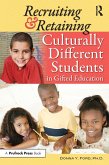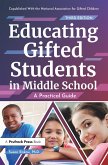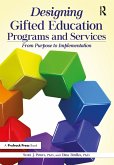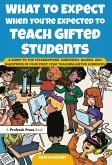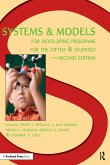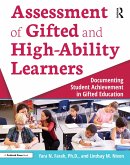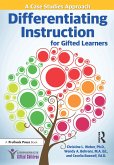Joseph Renzulli, Sally M Reis
Reflections on Gifted Education
Critical Works by Joseph S. Renzulli and Colleagues
Joseph Renzulli, Sally M Reis
Reflections on Gifted Education
Critical Works by Joseph S. Renzulli and Colleagues
- Broschiertes Buch
- Merkliste
- Auf die Merkliste
- Bewerten Bewerten
- Teilen
- Produkt teilen
- Produkterinnerung
- Produkterinnerung
In this compelling book, more than 40 years of research and development are highlighted in a collection of articles published by Joseph S. Renzulli and his colleagues.
Andere Kunden interessierten sich auch für
![Recruiting & Retaining Culturally Different Students in Gifted Education Recruiting & Retaining Culturally Different Students in Gifted Education]() Donna Y FordRecruiting & Retaining Culturally Different Students in Gifted Education39,99 €
Donna Y FordRecruiting & Retaining Culturally Different Students in Gifted Education39,99 €![Educating Gifted Students in Middle School Educating Gifted Students in Middle School]() Susan RakowEducating Gifted Students in Middle School46,99 €
Susan RakowEducating Gifted Students in Middle School46,99 €![Designing Gifted Education Programs and Services Designing Gifted Education Programs and Services]() Scott J PetersDesigning Gifted Education Programs and Services48,99 €
Scott J PetersDesigning Gifted Education Programs and Services48,99 €![What to Expect When You're Expected to Teach Gifted Students What to Expect When You're Expected to Teach Gifted Students]() Kari LockhartWhat to Expect When You're Expected to Teach Gifted Students27,99 €
Kari LockhartWhat to Expect When You're Expected to Teach Gifted Students27,99 €![Systems and Models for Developing Programs for the Gifted and Talented Systems and Models for Developing Programs for the Gifted and Talented]() Joseph S RenzulliSystems and Models for Developing Programs for the Gifted and Talented86,99 €
Joseph S RenzulliSystems and Models for Developing Programs for the Gifted and Talented86,99 €![Assessment of Gifted and High-Ability Learners Assessment of Gifted and High-Ability Learners]() Joan L GreenAssessment of Gifted and High-Ability Learners42,99 €
Joan L GreenAssessment of Gifted and High-Ability Learners42,99 €![Differentiating Instruction for Gifted Learners Differentiating Instruction for Gifted Learners]() Christine L WeberDifferentiating Instruction for Gifted Learners39,99 €
Christine L WeberDifferentiating Instruction for Gifted Learners39,99 €
In this compelling book, more than 40 years of research and development are highlighted in a collection of articles published by Joseph S. Renzulli and his colleagues.
Hinweis: Dieser Artikel kann nur an eine deutsche Lieferadresse ausgeliefert werden.
Hinweis: Dieser Artikel kann nur an eine deutsche Lieferadresse ausgeliefert werden.
Produktdetails
- Produktdetails
- Verlag: Taylor & Francis Ltd (Sales)
- Seitenzahl: 504
- Erscheinungstermin: 15. November 2015
- Englisch
- Abmessung: 256mm x 179mm x 32mm
- Gewicht: 1037g
- ISBN-13: 9781618215055
- ISBN-10: 1618215051
- Artikelnr.: 43599175
- Herstellerkennzeichnung
- Libri GmbH
- Europaallee 1
- 36244 Bad Hersfeld
- gpsr@libri.de
- Verlag: Taylor & Francis Ltd (Sales)
- Seitenzahl: 504
- Erscheinungstermin: 15. November 2015
- Englisch
- Abmessung: 256mm x 179mm x 32mm
- Gewicht: 1037g
- ISBN-13: 9781618215055
- ISBN-10: 1618215051
- Artikelnr.: 43599175
- Herstellerkennzeichnung
- Libri GmbH
- Europaallee 1
- 36244 Bad Hersfeld
- gpsr@libri.de
Joseph Renzulli is a professor of educational psychology at the University of Connecticut, where he also has served as the director of the Renzulli Center For Creativity, Gifted Education, and Talent Development. Sally M. Reis is the Vice Provost for Academic Affairs, the Letitia Neag Morgan Chair in Educational Psychology, a Board of Trustees Distinguished Professor, and a University Teaching Fellow at the University of Connecticut. She was a teacher for 15 years, 11 of which were spent working with gifted students on the elementary, junior high, and high school levels. She has authored or coauthored over 250 articles, books, book chapters, monographs, and technical reports.
Preface An Introduction, Some Personal Stories From Some Very Special
People, and a Reader's Guide Part I A General Approach to the Study of
Giftedness and Overview of Major Models Chapter 1 Examining the Challenges
and Caveats of Change in Gifted Education Chapter 2 Reexamining the Role of
Gifted Education and Talent Development for the 21st Century: A Four-Part
Theoretical Approach Part II Conceptions and Identification of Giftedness
Chapter 3 The Three-Ring Conception of Giftedness: A Developmental Model
for Promoting Creative Productivity Chapter 4 Defensible and Doable: A
Practical, Multiple-Criteria Gifted Program Identification System Chapter 5
Intelligences Outside the Normal Curve: Co-Cognitive Factors That
Contribute to the Creation of Social Capital and Leadership Skills in Young
People Chapter 6 Assumptions Underlying the Identification of Gifted and
Talented Students Part III Systems and Models for the Development of
Giftedness and Talents Chapter 7 A Theory of Blended Knowledge for the
Development of Creative Productive Giftedness Chapter 8 The Enrichment
Triad Model: A Guide for Developing Defensible Programs for the Gifted and
Talented Chapter 9 The Multiple Menu Model for Developing Differentiated
Curriculum Part IV Implementation Components and Strategies Chapter 10 The
Schoolwide Enrichment Model: A Focus on Student Strengths and Interests
Chapter 11 Curriculum Compacting and Achievement Test Scores: What Does the
Research Say? Chapter 12 A Time and a Place for Authentic Learning Chapter
13 Academies of Inquiry and Talent Development Chapter 14 A Technology
Based Program That Matches Enrichment Resources With Student Strengths
Chapter 15 Savoring Reading Schoolwide Chapter 16 Nurturing Young Student
Mathematicians Part V Contemporary Issues, Challenges, and Commentary
Chapter 17 The Achievement Gap and the Educational Conspiracy Against
Low-Income Children Chapter 18 From High Potential to Gifted Performance:
Encouraging Academically Talented Urban Students Chapter 19 An
Infusion-Based Approach to Enriching the Standards-Driven Curriculum
Chapter 20 Reversing Underachievement Through Enrichment Chapter 21
Commentary on Contemporary Issues Chapter 22 A Biographical Portrait of
Joseph S. Renzulli: Scholar, Gifted Educator, and Visionary Leader About
the Editor
People, and a Reader's Guide Part I A General Approach to the Study of
Giftedness and Overview of Major Models Chapter 1 Examining the Challenges
and Caveats of Change in Gifted Education Chapter 2 Reexamining the Role of
Gifted Education and Talent Development for the 21st Century: A Four-Part
Theoretical Approach Part II Conceptions and Identification of Giftedness
Chapter 3 The Three-Ring Conception of Giftedness: A Developmental Model
for Promoting Creative Productivity Chapter 4 Defensible and Doable: A
Practical, Multiple-Criteria Gifted Program Identification System Chapter 5
Intelligences Outside the Normal Curve: Co-Cognitive Factors That
Contribute to the Creation of Social Capital and Leadership Skills in Young
People Chapter 6 Assumptions Underlying the Identification of Gifted and
Talented Students Part III Systems and Models for the Development of
Giftedness and Talents Chapter 7 A Theory of Blended Knowledge for the
Development of Creative Productive Giftedness Chapter 8 The Enrichment
Triad Model: A Guide for Developing Defensible Programs for the Gifted and
Talented Chapter 9 The Multiple Menu Model for Developing Differentiated
Curriculum Part IV Implementation Components and Strategies Chapter 10 The
Schoolwide Enrichment Model: A Focus on Student Strengths and Interests
Chapter 11 Curriculum Compacting and Achievement Test Scores: What Does the
Research Say? Chapter 12 A Time and a Place for Authentic Learning Chapter
13 Academies of Inquiry and Talent Development Chapter 14 A Technology
Based Program That Matches Enrichment Resources With Student Strengths
Chapter 15 Savoring Reading Schoolwide Chapter 16 Nurturing Young Student
Mathematicians Part V Contemporary Issues, Challenges, and Commentary
Chapter 17 The Achievement Gap and the Educational Conspiracy Against
Low-Income Children Chapter 18 From High Potential to Gifted Performance:
Encouraging Academically Talented Urban Students Chapter 19 An
Infusion-Based Approach to Enriching the Standards-Driven Curriculum
Chapter 20 Reversing Underachievement Through Enrichment Chapter 21
Commentary on Contemporary Issues Chapter 22 A Biographical Portrait of
Joseph S. Renzulli: Scholar, Gifted Educator, and Visionary Leader About
the Editor
Preface An Introduction, Some Personal Stories From Some Very Special
People, and a Reader's Guide Part I A General Approach to the Study of
Giftedness and Overview of Major Models Chapter 1 Examining the Challenges
and Caveats of Change in Gifted Education Chapter 2 Reexamining the Role of
Gifted Education and Talent Development for the 21st Century: A Four-Part
Theoretical Approach Part II Conceptions and Identification of Giftedness
Chapter 3 The Three-Ring Conception of Giftedness: A Developmental Model
for Promoting Creative Productivity Chapter 4 Defensible and Doable: A
Practical, Multiple-Criteria Gifted Program Identification System Chapter 5
Intelligences Outside the Normal Curve: Co-Cognitive Factors That
Contribute to the Creation of Social Capital and Leadership Skills in Young
People Chapter 6 Assumptions Underlying the Identification of Gifted and
Talented Students Part III Systems and Models for the Development of
Giftedness and Talents Chapter 7 A Theory of Blended Knowledge for the
Development of Creative Productive Giftedness Chapter 8 The Enrichment
Triad Model: A Guide for Developing Defensible Programs for the Gifted and
Talented Chapter 9 The Multiple Menu Model for Developing Differentiated
Curriculum Part IV Implementation Components and Strategies Chapter 10 The
Schoolwide Enrichment Model: A Focus on Student Strengths and Interests
Chapter 11 Curriculum Compacting and Achievement Test Scores: What Does the
Research Say? Chapter 12 A Time and a Place for Authentic Learning Chapter
13 Academies of Inquiry and Talent Development Chapter 14 A Technology
Based Program That Matches Enrichment Resources With Student Strengths
Chapter 15 Savoring Reading Schoolwide Chapter 16 Nurturing Young Student
Mathematicians Part V Contemporary Issues, Challenges, and Commentary
Chapter 17 The Achievement Gap and the Educational Conspiracy Against
Low-Income Children Chapter 18 From High Potential to Gifted Performance:
Encouraging Academically Talented Urban Students Chapter 19 An
Infusion-Based Approach to Enriching the Standards-Driven Curriculum
Chapter 20 Reversing Underachievement Through Enrichment Chapter 21
Commentary on Contemporary Issues Chapter 22 A Biographical Portrait of
Joseph S. Renzulli: Scholar, Gifted Educator, and Visionary Leader About
the Editor
People, and a Reader's Guide Part I A General Approach to the Study of
Giftedness and Overview of Major Models Chapter 1 Examining the Challenges
and Caveats of Change in Gifted Education Chapter 2 Reexamining the Role of
Gifted Education and Talent Development for the 21st Century: A Four-Part
Theoretical Approach Part II Conceptions and Identification of Giftedness
Chapter 3 The Three-Ring Conception of Giftedness: A Developmental Model
for Promoting Creative Productivity Chapter 4 Defensible and Doable: A
Practical, Multiple-Criteria Gifted Program Identification System Chapter 5
Intelligences Outside the Normal Curve: Co-Cognitive Factors That
Contribute to the Creation of Social Capital and Leadership Skills in Young
People Chapter 6 Assumptions Underlying the Identification of Gifted and
Talented Students Part III Systems and Models for the Development of
Giftedness and Talents Chapter 7 A Theory of Blended Knowledge for the
Development of Creative Productive Giftedness Chapter 8 The Enrichment
Triad Model: A Guide for Developing Defensible Programs for the Gifted and
Talented Chapter 9 The Multiple Menu Model for Developing Differentiated
Curriculum Part IV Implementation Components and Strategies Chapter 10 The
Schoolwide Enrichment Model: A Focus on Student Strengths and Interests
Chapter 11 Curriculum Compacting and Achievement Test Scores: What Does the
Research Say? Chapter 12 A Time and a Place for Authentic Learning Chapter
13 Academies of Inquiry and Talent Development Chapter 14 A Technology
Based Program That Matches Enrichment Resources With Student Strengths
Chapter 15 Savoring Reading Schoolwide Chapter 16 Nurturing Young Student
Mathematicians Part V Contemporary Issues, Challenges, and Commentary
Chapter 17 The Achievement Gap and the Educational Conspiracy Against
Low-Income Children Chapter 18 From High Potential to Gifted Performance:
Encouraging Academically Talented Urban Students Chapter 19 An
Infusion-Based Approach to Enriching the Standards-Driven Curriculum
Chapter 20 Reversing Underachievement Through Enrichment Chapter 21
Commentary on Contemporary Issues Chapter 22 A Biographical Portrait of
Joseph S. Renzulli: Scholar, Gifted Educator, and Visionary Leader About
the Editor


